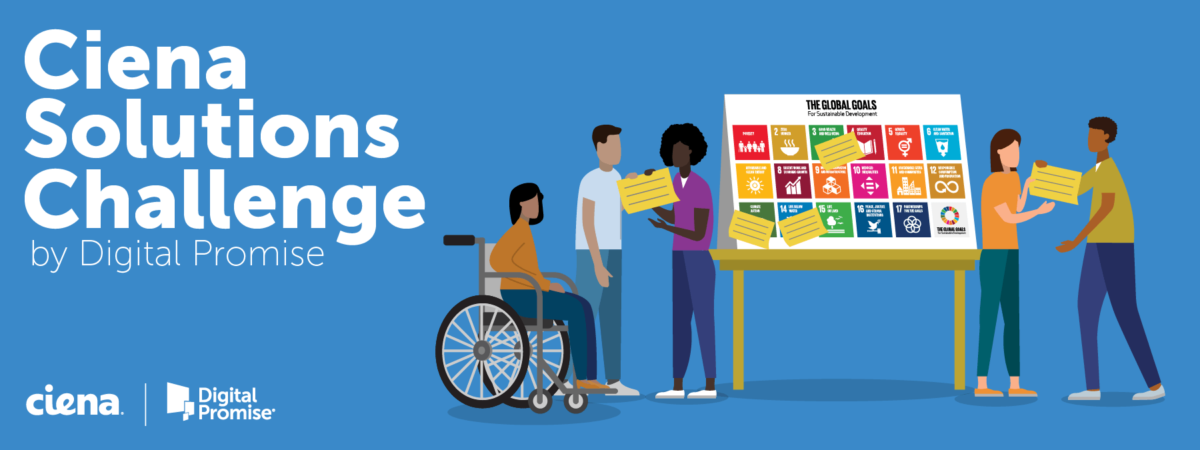
The Ciena Solutions Challenge invites educators and students around the world to engage in Challenge Based Learning (CBL) to design solutions that address the United Nations Sustainable Development Goals (SDGs). Since launching in 2021, more than 200 teachers from schools and youth organizations across 48 countries have engaged with the Challenge.
In March 2022, we celebrated the first 17 global Ciena Solutions Challenge Sustainability Award recipients and launched a project gallery featuring projects from student teams in Botswana, Brazil, Canada, Colombia, India, Mozambique, Nigeria, Tanzania, Uganda, the United States, and Zimbabwe. From an intergenerational blog preserving and sharing Indigenous knowledge, to an interactive school map to make refugee students feel more comfortable at a new school, these projects represent the creativity and innovation of young people from around the world.
Seeking to learn from and support educators and students in the program, the Ciena Solutions Challenge team similarly aligned its evaluation activities with the Sustainable Development Goals, specifically UNESCO’s Global Framework of Reference on Digital Literacy Skills for Indicator 4.4.2, the digital skills indicator within Sustainable Development Goal 4: Quality Education. The framework breaks digital competence into five competencies with sub-competencies under each. The competencies are: information and data literacy, communication and collaboration, digital content creation, safety, and problem solving. Together, these five competencies cover major digital literacies and skills that we hope to see supported and nurtured by students’ participation in the Ciena Solutions Challenge.
Findings from the first year of the Challenge illuminate the value of focusing on competencies and skills like these rather than on particular tools and devices, and of centering student AND educator creativity and innovation through flexible frameworks like CBL, which engages participants in community-based problem solving.
Reflecting on their experiences, educators emphasized the importance of knowing and being responsive to their students and their own local context and giving students agency and decision-making power over the issues they explored, the challenges they chose to solve, and the action concepts they developed. Educators described themselves as project managers, mentors, facilitators, guides, partners in learning, and motivators who monitor and offer support, while allowing the projects to be mostly student driven.
As one educator noted, “It was exciting…when I was introducing my students to learn in a different way and to learn collaboratively with the community because the issues that we are handling were issues within our community which required action. And it was like nobody was doing it and when my students realized that they could be part of the solution, it was exciting.”
Students similarly described themselves as stepping into new roles and developing skills to look at the world in new ways through their participation in the Ciena Solutions Challenge. In a survey of student participants, 94% of students agreed or strongly agreed that the Ciena Solutions Challenge was different from activities they typically do in school. One student commented, “It was a totally different experience, which changed my view of the areas and ways of learning.”
The shift in how and what students learned included learning and using new skills that are not always exhibited in school. Students described gaining and applying communication and team work skills, programming skills to develop apps and program Arduino microcontrollers, critical or divergent thinking, and digital media skills. The majority of student respondents believed the skills they used during the Challenge would support them in school as well as future jobs or careers. They also overwhelmingly agreed or strongly agreed that the actions they took as part of the Ciena Solutions Challenge made a difference in their school or community.
Building on the creativity and innovation of participants in the first round of the program, we are excited to expand the Ciena Solutions Challenge Resource Library in the coming months with real world examples that feature diverse approaches from educators for cultivating students’ digital literacy skills and learning beyond the walls of the classroom.
Learn More